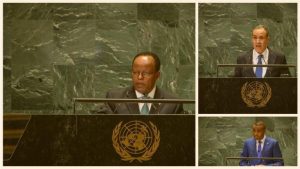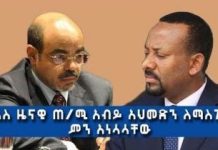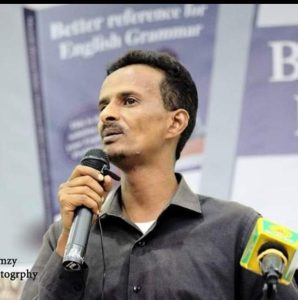In a time of heightened geopolitical tension in the Horn of Africa, the representatives of Ethiopia, Egypt, and Somalia took the stage to articulate their countries’ respective positions regarding a controversial Memorandum of Understanding (MoU) that Somaliland signed with Ethiopia, and related regional issues. These speeches reflect not only the diverse strategic interests of each state but also their distinct diplomatic approaches to addressing both domestic concerns and international perceptions.
This analysis will delve into the speeches of 𝐨𝐟 𝐄𝐭𝐡𝐢𝐨𝐩𝐢𝐚’𝐬 𝐅𝐨𝐫𝐞𝐢𝐠𝐧 𝐌𝐢𝐧𝐢𝐬𝐭𝐞𝐫 𝐓𝐚𝐲𝐞 𝐀𝐭𝐬𝐤𝐞-𝐒𝐞𝐥𝐚𝐬𝐬𝐢𝐞 𝐀𝐦𝐝𝐞, 𝐄𝐠𝐲𝐩𝐭’𝐬 𝐅𝐨𝐫𝐞𝐢𝐠𝐧 𝐌𝐢𝐧𝐢𝐬𝐭𝐞𝐫 𝐒𝐚𝐦𝐞𝐡 𝐒𝐡𝐨𝐮𝐤𝐫𝐲, 𝐚𝐧𝐝 𝐒𝐨𝐦𝐚𝐥𝐢𝐚’𝐬 𝐏𝐫𝐢𝐦𝐞 𝐌𝐢𝐧𝐢𝐬𝐭𝐞𝐫 𝐇𝐚𝐦𝐳𝐚 𝐀𝐛𝐝𝐢 𝐁𝐚𝐫𝐫𝐞, drawing comparisons between their rhetorical styles, diplomatic tones, and core messages. It will ultimately determine which of these leaders demonstrated the most diplomatic acumen in navigating these complex and often contentious issues.
𝐄𝐭𝐡𝐢𝐨𝐩𝐢𝐚’𝐬 𝐃𝐢𝐩𝐥𝐨𝐦𝐚𝐭𝐢𝐜 𝐀𝐩𝐩𝐫𝐨𝐚𝐜𝐡: 𝐓𝐚𝐲𝐞 𝐀𝐭𝐬𝐤𝐞-𝐒𝐞𝐥𝐚𝐬𝐬𝐢𝐞 𝐀𝐦𝐝𝐞
_____________________________________________________
In his address, Ethiopia’s Foreign Minister Taye Atske-Selassie Amde focused on defending Ethiopia’s engagement with Somalia, particularly regarding a contentious Memorandum of Understanding (MoU) that has elicited concern from both Egypt and Somalia. Amde’s speech was carefully constructed, with a clear emphasis on maintaining Ethiopia’s image as a responsible regional power committed to peaceful cooperation, regional stability, and economic development
”𝐊𝐞𝐲 𝐐𝐮𝐨𝐭𝐞: “𝐄𝐭𝐡𝐢𝐨𝐩𝐢𝐚 𝐡𝐚𝐬 𝐚𝐥𝐰𝐚𝐲𝐬 𝐬𝐨𝐮𝐠𝐡𝐭 𝐝𝐢𝐚𝐥𝐨𝐠𝐮𝐞 𝐨𝐯𝐞𝐫 𝐝𝐢𝐬𝐜𝐨𝐫𝐝 𝐚𝐧𝐝 𝐜𝐨𝐥𝐥𝐚𝐛𝐨𝐫𝐚𝐭𝐢𝐨𝐧 𝐨𝐯𝐞𝐫 𝐜𝐨𝐧𝐟𝐥𝐢𝐜𝐭.”
Minister Amde’s speech underscored Ethiopia’s aspirations for regional stability, portraying the MoU as a step towards fostering deeper cooperation with Somalia rather than an aggressive attempt to undermine the sovereignty of neighboring states. He meticulously avoided inflammatory language and framed Ethiopia’s foreign policy as one centered on respect for international norms and bilateral partnerships.
𝐊𝐞𝐲 𝐐𝐮𝐨𝐭𝐞: “𝐄𝐭𝐡𝐢𝐨𝐩𝐢𝐚 𝐡𝐚𝐬 𝐚𝐥𝐰𝐚𝐲𝐬 𝐬𝐨𝐮𝐠𝐡𝐭 𝐝𝐢𝐚𝐥𝐨𝐠𝐮𝐞 𝐨𝐯𝐞𝐫 𝐝𝐢𝐬𝐜𝐨𝐫𝐝 𝐚𝐧𝐝 𝐜𝐨𝐥𝐥𝐚𝐛𝐨𝐫𝐚𝐭𝐢𝐨𝐧 𝐨𝐯𝐞𝐫 𝐜𝐨𝐧𝐟𝐥𝐢𝐜𝐭.”
______________
Addressing Egypt’s concerns over the MoU’s implications for water diplomacy, specifically regarding the Grand Ethiopian Renaissance Dam (GERD), Amde firmly rejected any suggestion that Ethiopia’s agreements with Somalia were part of a broader strategy to control the flow of the Nile. He stated unequivocally:
“𝐖𝐞 𝐜𝐚𝐭𝐞𝐠𝐨𝐫𝐢𝐜𝐚𝐥𝐥𝐲 𝐫𝐞𝐣𝐞𝐜𝐭 𝐚𝐧𝐲 𝐧𝐚𝐫𝐫𝐚𝐭𝐢𝐯𝐞 𝐭𝐡𝐚𝐭 𝐬𝐞𝐞𝐤𝐬 𝐭𝐨 𝐩𝐚𝐢𝐧𝐭 𝐄𝐭𝐡𝐢𝐨𝐩𝐢𝐚 𝐚𝐬 𝐮𝐧𝐝𝐞𝐫𝐦𝐢𝐧𝐢𝐧𝐠 𝐭𝐡𝐞 𝐫𝐞𝐠𝐢𝐨𝐧𝐚𝐥 𝐰𝐚𝐭𝐞𝐫 𝐛𝐚𝐥𝐚𝐧𝐜𝐞. 𝐓𝐡𝐞 𝐚𝐠𝐫𝐞𝐞𝐦𝐞𝐧𝐭 𝐰𝐢𝐭𝐡 𝐒𝐨𝐦𝐚𝐥𝐢𝐚 𝐢𝐬 𝐟𝐨𝐜𝐮𝐬𝐞𝐝 𝐬𝐨𝐥𝐞𝐥𝐲 𝐨𝐧 𝐝𝐞𝐯𝐞𝐥𝐨𝐩𝐦𝐞𝐧𝐭, 𝐜𝐨𝐨𝐩𝐞𝐫𝐚𝐭𝐢𝐨𝐧, 𝐚𝐧𝐝 𝐦𝐮𝐭𝐮𝐚𝐥 𝐛𝐞𝐧𝐞𝐟𝐢𝐭𝐬, 𝐮𝐧𝐜𝐨𝐧𝐧𝐞𝐜𝐭𝐞𝐝 𝐭𝐨 𝐚𝐧𝐲 𝐛𝐫𝐨𝐚𝐝𝐞𝐫 𝐠𝐞𝐨𝐩𝐨𝐥𝐢𝐭𝐢𝐜𝐚𝐥 𝐬𝐭𝐫𝐚𝐭𝐞𝐠𝐲 𝐫𝐞𝐠𝐚𝐫𝐝𝐢𝐧𝐠 𝐭𝐡𝐞 𝐍𝐢𝐥𝐞.”
This statement was a clear attempt to distance the MoU from the highly charged discussions around the GERD, highlighting Ethiopia’s desire to be viewed as a cooperative actor rather than an instigator of regional tensions. By reinforcing that Ethiopia’s dealings with Somalia are purely developmental, Amde aimed to diffuse any linkage to broader concerns over Nile water rights.
𝐑𝐞𝐬𝐩𝐨𝐧𝐬𝐞 𝐭𝐨 𝐒𝐨𝐦𝐚𝐥𝐢𝐚’𝐬 𝐂𝐨𝐧𝐜𝐞𝐫𝐧𝐬
______________
Turning to Somalia’s apprehensions regarding Ethiopian influence, Amde was diplomatic yet firm. He addressed Somalia’s fears that the MoU signified an erosion of its autonomy by asserting that the agreement was based on equal partnership. In a strategic rhetorical move, he emphasized:
“𝐄𝐭𝐡𝐢𝐨𝐩𝐢𝐚 𝐝𝐨𝐞𝐬 𝐧𝐨𝐭, 𝐚𝐧𝐝 𝐰𝐢𝐥𝐥 𝐧𝐞𝐯𝐞𝐫, 𝐢𝐦𝐩𝐨𝐬𝐞 𝐢𝐭𝐬 𝐰𝐢𝐥𝐥 𝐨𝐧 𝐚𝐧𝐲 𝐬𝐨𝐯𝐞𝐫𝐞𝐢𝐠𝐧 𝐬𝐭𝐚𝐭𝐞. 𝐓𝐡𝐞 𝐌𝐨𝐔 𝐬𝐢𝐠𝐧𝐞𝐝 𝐰𝐢𝐭𝐡 𝐒𝐨𝐦𝐚𝐥𝐢𝐚 𝐢𝐬 𝐛𝐚𝐬𝐞𝐝 𝐨𝐧 𝐦𝐮𝐭𝐮𝐚𝐥 𝐢𝐧𝐭𝐞𝐫𝐞𝐬𝐭𝐬, 𝐚𝐝𝐝𝐫𝐞𝐬𝐬𝐢𝐧𝐠 𝐚𝐫𝐞𝐚𝐬 𝐬𝐮𝐜𝐡 𝐚𝐬 𝐢𝐧𝐟𝐫𝐚𝐬𝐭𝐫𝐮𝐜𝐭𝐮𝐫𝐞, 𝐭𝐫𝐚𝐝𝐞, 𝐚𝐧𝐝 𝐬𝐞𝐜𝐮𝐫𝐢𝐭𝐲. 𝐈𝐭 𝐢𝐬 𝐚 𝐩𝐚𝐫𝐭𝐧𝐞𝐫𝐬𝐡𝐢𝐩, 𝐧𝐨𝐭 𝐚 𝐩𝐨𝐰𝐞𝐫 𝐠𝐫𝐚𝐛.”
This declaration not only countered allegations of Ethiopian dominance but also reinforced the notion that Ethiopia is a responsible partner committed to regional cooperation. By invoking mutual interests, Amde sought to position Ethiopia as a nation interested in collective progress, rather than unilateral gain
𝐃𝐢𝐩𝐥𝐨𝐦𝐚𝐭𝐢𝐜 𝐒𝐭𝐫𝐚𝐭𝐞𝐠𝐲
_____________
Throughout his speech, Amde maintained a tone of calm diplomacy, steering clear of any rhetoric that could exacerbate tensions. His approach was one of de-escalation, with frequent references to Ethiopia’s commitment to peaceful dialogue. His repeated use of phrases such as “shared vision for peace” and “mutual respect” aimed to underscore Ethiopia’s long-standing role as a stabilizing force in the Horn of Africa. This strategy of projecting Ethiopia as a peaceful and constructive actor starkly contrasted the more forceful rhetoric employed by Egypt and Somalia.
𝐄𝐠𝐲𝐩𝐭’𝐬 𝐃𝐢𝐩𝐥𝐨𝐦𝐚𝐭𝐢𝐜 𝐀𝐩𝐩𝐞𝐚𝐥: 𝐒𝐚𝐦𝐞𝐡 𝐒𝐡𝐨𝐮𝐤𝐫𝐲
_______________
𝐄𝐠𝐲𝐩𝐭’𝐬 𝐅𝐨𝐫𝐞𝐢𝐠𝐧 𝐌𝐢𝐧𝐢𝐬𝐭𝐞𝐫 𝐒𝐚𝐦𝐞𝐡 𝐒𝐡𝐨𝐮𝐤𝐫𝐲 delivered a speech that was equally measured yet notably more assertive, reflecting Egypt’s deep concerns regarding Ethiopia’s handling of the GERD and its broader regional actions. Shoukry’s speech revolved around Egypt’s historical and legal claims to the Nile, which he framed as an existential issue for Egypt’s survival, while also touching on Egypt’s concerns over Ethiopia’s influence in Somalia.
𝐊𝐞𝐲 𝐐𝐮𝐨𝐭𝐞: “𝐄𝐭𝐡𝐢𝐨𝐩𝐢𝐚 𝐡𝐚𝐬 𝐚𝐝𝐨𝐩𝐭𝐞𝐝 𝐚 𝐩𝐨𝐥𝐢𝐜𝐲 𝐨𝐟 𝐝𝐞𝐥𝐚𝐲 𝐚𝐧𝐝 𝐢𝐧𝐟𝐥𝐞𝐱𝐢𝐛𝐢𝐥𝐢𝐭𝐲, 𝐬𝐞𝐞𝐤𝐢𝐧𝐠 𝐭𝐨 𝐞𝐧𝐟𝐨𝐫𝐜𝐞 𝐚 𝐟𝐚𝐢𝐭 𝐚𝐜𝐜𝐨𝐦𝐩𝐥𝐢 𝐰𝐢𝐭𝐡𝐨𝐮𝐭 𝐫𝐞𝐠𝐚𝐫𝐝 𝐟𝐨𝐫 𝐭𝐡𝐞 𝐥𝐞𝐠𝐚𝐥 𝐫𝐢𝐠𝐡𝐭𝐬 𝐨𝐟 𝐝𝐨𝐰𝐧𝐬𝐭𝐫𝐞𝐚𝐦 𝐬𝐭𝐚𝐭𝐞𝐬.”
By characterizing Ethiopia’s behavior as inflexible, Shoukry sought to position Egypt as a patient, law-abiding state that had exhausted all diplomatic avenues in dealing with Ethiopia. His choice of the term “fait accompli” underscored the perception that Ethiopia was attempting to force its will upon downstream countries, effectively sidelining their legitimate concerns.
𝐂𝐨𝐧𝐜𝐞𝐫𝐧𝐬 𝐎𝐯𝐞𝐫 𝐭𝐡𝐞 𝐆𝐄𝐑𝐃
_______________
Shoukry’s central theme was Egypt’s concerns over the GERD, which he described as a project with the potential to destabilize the entire region if left unchecked. He painted Ethiopia as a state willing to unilaterally endanger its neighbors’ water security:
“𝐈𝐭 𝐢𝐬 𝐚 𝐦𝐢𝐬𝐭𝐚𝐤𝐞 𝐭𝐨 𝐚𝐬𝐬𝐮𝐦𝐞 𝐭𝐡𝐚𝐭 𝐄𝐠𝐲𝐩𝐭 𝐰𝐢𝐥𝐥 𝐫𝐞𝐦𝐚𝐢𝐧 𝐩𝐚𝐬𝐬𝐢𝐯𝐞 𝐢𝐧 𝐭𝐡𝐞 𝐟𝐚𝐜𝐞 𝐨𝐟 𝐚𝐜𝐭𝐢𝐨𝐧𝐬 𝐭𝐡𝐚𝐭 𝐭𝐡𝐫𝐞𝐚𝐭𝐞𝐧 𝐢𝐭𝐬 𝐯𝐞𝐫𝐲 𝐞𝐱𝐢𝐬𝐭𝐞𝐧𝐜𝐞.”
This powerful statement demonstrated Egypt’s resolve, making clear that while Egypt prefers diplomacy, it would not hesitate to act in defense of its national interests if provoked. Shoukry’s tone, while diplomatic, was noticeably more urgent than Amde’s, reflecting the gravity with which Egypt views the Nile as a lifeline for its population.
Shoukry’s speech also extended to Egypt’s concerns about Somali sovereignty, where he criticized Ethiopia’s agreements with Somaliland and other factions in Somalia. In a clear signal of solidarity with Somalia, Shoukry declared:
“𝐖𝐞 𝐬𝐭𝐚𝐧𝐝 𝐚𝐠𝐚𝐢𝐧𝐬𝐭 𝐚𝐧𝐲 𝐚𝐜𝐭𝐢𝐨𝐧𝐬 𝐭𝐡𝐚𝐭 𝐰𝐨𝐮𝐥𝐝 𝐟𝐫𝐚𝐠𝐦𝐞𝐧𝐭 𝐒𝐨𝐦𝐚𝐥𝐢𝐚’𝐬 𝐧𝐚𝐭𝐢𝐨𝐧𝐚𝐥 𝐬𝐨𝐯𝐞𝐫𝐞𝐢𝐠𝐧𝐭𝐲.”
This statement, though indirectly critical of Ethiopia, was diplomatically phrased to appeal to international norms of non-interference and respect for territorial integrity. It framed Egypt as a protector of regional stability, calling on the international community to uphold Somalia’s sovereignty
𝐃𝐢𝐩𝐥𝐨𝐦𝐚𝐭𝐢𝐜 𝐒𝐭𝐫𝐚𝐭𝐞𝐠𝐲
_________________
Shoukry’s speech balanced assertiveness with a call for adherence to international law. His references to Egypt’s longstanding diplomatic efforts, juxtaposed with Ethiopia’s alleged unilateralism, aimed to win over international opinion by presenting Egypt as the reasonable party in the GERD dispute. His diplomatic tone was more forceful than Amde’s, reflecting Egypt’s higher stakes in the matter, but Shoukry was careful to leave the door open for further dialogue, consistently urging a peaceful resolution through international frameworks.
𝐒𝐨𝐦𝐚𝐥𝐢𝐚’𝐬 𝐃𝐢𝐩𝐥𝐨𝐦𝐚𝐭𝐢𝐜 𝐒𝐭𝐚𝐧𝐜𝐞: 𝐇𝐚𝐦𝐳𝐚 𝐀𝐛𝐝𝐢 𝐁𝐚𝐫𝐫𝐞
___________________
𝐏𝐫𝐢𝐦𝐞 𝐌𝐢𝐧𝐢𝐬𝐭𝐞𝐫 𝐇𝐚𝐦𝐳𝐚 𝐀𝐛𝐝𝐢 𝐁𝐚𝐫𝐫𝐞 of Somalia delivered a speech that was more direct and confrontational than those of his counterparts from Ethiopia and Egypt. Barre focused primarily on defending Somalia’s sovereignty, particularly on the MoU signed between Ethiopia and Somaliland, which Somalia views as a violation of its territorial integrity.
𝐊𝐞𝐲 𝐐𝐮𝐨𝐭𝐞: “𝐄𝐭𝐡𝐢𝐨𝐩𝐢𝐚’𝐬 𝐚𝐭𝐭𝐞𝐦𝐩𝐭𝐬 𝐭𝐨 𝐚𝐧𝐧𝐞𝐱 𝐩𝐚𝐫𝐭𝐬 𝐨𝐟 𝐒𝐨𝐦𝐚𝐥𝐢𝐚 𝐮𝐧𝐝𝐞𝐫 𝐭𝐡𝐞 𝐠𝐮𝐢𝐬𝐞 𝐨𝐟 𝐬𝐞𝐜𝐮𝐫𝐢𝐧𝐠 𝐬𝐞𝐚 𝐚𝐜𝐜𝐞𝐬𝐬 𝐚𝐫𝐞 𝐛𝐨𝐭𝐡 𝐮𝐧𝐥𝐚𝐰𝐟𝐮𝐥 𝐚𝐧𝐝 𝐮𝐧𝐧𝐞𝐜𝐞𝐬𝐬𝐚𝐫𝐲.”
Barre’s use of the term “𝐚𝐧𝐧𝐞𝐱” was intentionally strong, signaling Somalia’s deep displeasure with Ethiopia’s actions and its perception that Ethiopia was overstepping its bounds. His speech was less diplomatic in tone, opting instead for a forceful defense of Somali sovereignty.
𝐂𝐨𝐧𝐜𝐞𝐫𝐧𝐬 𝐎𝐯𝐞𝐫 𝐄𝐭𝐡𝐢𝐨𝐩𝐢𝐚𝐧 𝐈𝐧𝐟𝐥𝐮𝐞𝐧𝐜𝐞
______________
Barre’s main argument was that Ethiopia’s agreements with Somaliland and other entities within Somalia threatened the country’s territorial integrity. He described these agreements as “provocations” that could further destabilize a fragile region. Barre’s speech also linked Ethiopia’s actions to the rise of extremist groups within Somalia, warning that:”𝐄𝐭𝐡𝐢𝐨𝐩𝐢𝐚’𝐬 𝐩𝐫𝐨𝐯𝐨𝐜𝐚𝐭𝐢𝐨𝐧𝐬 𝐬𝐞𝐫𝐯𝐞 𝐚𝐬 𝐩𝐫𝐨𝐩𝐚𝐠𝐚𝐧𝐝𝐚 𝐟𝐨𝐫 𝐭𝐞𝐫𝐫𝐨𝐫𝐢𝐬𝐭 𝐠𝐫𝐨𝐮𝐩𝐬 𝐥𝐢𝐤𝐞 𝐀𝐥-𝐒𝐡𝐚𝐛𝐚𝐚𝐛, 𝐞𝐧𝐚𝐛𝐥𝐢𝐧𝐠 𝐭𝐡𝐞𝐦 𝐭𝐨 𝐫𝐞𝐜𝐫𝐮𝐢𝐭 𝐚𝐧𝐝 𝐫𝐚𝐝𝐢𝐜𝐚𝐥𝐢𝐳𝐞 𝐯𝐮𝐥𝐧𝐞𝐫𝐚𝐛𝐥𝐞 𝐢𝐧𝐝𝐢𝐯𝐢𝐝𝐮𝐚𝐥𝐬.”
This rhetoric was aimed at garnering international support for Somalia’s position by framing Ethiopia’s actions as a direct threat to regional security. By invoking the specter of terrorism, Barre sought to amplify the stakes of Ethiopia’s actions, painting them as not only a violation of Somali sovereignty but also a destabilizing force for the entire Horn of Africa.
𝐀𝐩𝐩𝐞𝐚𝐥 𝐭𝐨 𝐈𝐧𝐭𝐞𝐫𝐧𝐚𝐭𝐢𝐨𝐧𝐚𝐥 𝐋𝐚𝐰
___________________
Barre’s speech also made repeated references to international law, as he called for the international community to condemn Ethiopia’s actions. He asserted:
“𝐒𝐨𝐦𝐚𝐥𝐢𝐚 𝐚𝐬𝐬𝐞𝐫𝐭𝐬 𝐢𝐭𝐬 𝐬𝐨𝐯𝐞𝐫𝐞𝐢𝐠𝐧 𝐫𝐢𝐠𝐡𝐭 𝐭𝐨 𝐝𝐞𝐟𝐞𝐧𝐝 𝐢𝐭𝐬 𝐭𝐞𝐫𝐫𝐢𝐭𝐨𝐫𝐢𝐚𝐥 𝐢𝐧𝐭𝐞𝐠𝐫𝐢𝐭𝐲 𝐚𝐧𝐝 𝐜𝐚𝐥𝐥𝐬 𝐨𝐧 𝐄𝐭𝐡𝐢𝐨𝐩𝐢𝐚 𝐭𝐨 𝐜𝐞𝐚𝐬𝐞 𝐢𝐭𝐬 𝐩𝐫𝐨𝐯𝐨𝐜𝐚𝐭𝐢𝐨𝐧𝐬 𝐚𝐧𝐝 𝐚𝐝𝐡𝐞𝐫𝐞 𝐭𝐨 𝐢𝐧𝐭𝐞𝐫𝐧𝐚𝐭𝐢𝐨𝐧𝐚𝐥 𝐥𝐚𝐰.”
This was a direct appeal to international norms, casting Somalia as a country seeking justice through peaceful, legal channels while portraying Ethiopia as a rogue actor undermining the rules-based order. Barre’s language was combative, but it was rooted in the idea of international legitimacy, aiming to gain support from global powers.
𝐃𝐢𝐩𝐥𝐨𝐦𝐚𝐭𝐢𝐜 𝐒𝐭𝐫𝐚𝐭𝐞𝐠𝐲
_______________
While Barre’s speech was the most forceful of the three, it also reflected a sense of urgency and frustration. His tone was less conciliatory, favoring direct accusations and calls for action. This reflected Somalia’s precarious position in the region, as well as its desire to rally international opinion against what it sees as Ethiopia’s overreach. However, the lack of diplomatic nuance in Barre’s speech may have limited its appeal compared to the more measured tones of Amde and Shoukry.
𝐂𝐨𝐦𝐩𝐚𝐫𝐚𝐭𝐢𝐯𝐞 𝐃𝐢𝐩𝐥𝐨𝐦𝐚𝐭𝐢𝐜 𝐄𝐟𝐟𝐢𝐜𝐚𝐜𝐲
_______________
1. 𝐓𝐚𝐲𝐞 𝐀𝐭𝐬𝐤𝐞-𝐒𝐞𝐥𝐚𝐬𝐬𝐢𝐞 𝐀𝐦𝐝𝐞 (𝐄𝐭𝐡𝐢𝐨𝐩𝐢𝐚): Amde’s speech stood out for its calm, measured tone, which emphasized dialogue and cooperation over confrontation. By framing the MoU as a partnership based on mutual interests, Amde sought to defuse tensions with both Egypt and Somalia, portraying Ethiopia as a responsible regional actor. His emphasis on transparency and mutual respect gave his speech a diplomatic advantage, as he skillfully avoided any escalation of rhetoric while defending Ethiopia’s actions.
𝟐. 𝐒𝐚𝐦𝐞𝐡 𝐒𝐡𝐨𝐮𝐤𝐫𝐲 (𝐄𝐠𝐲𝐩𝐭): Shoukry’s speech was more assertive, reflecting the existential stakes that the GERD represents for Egypt. His emphasis on international law and Egypt’s patience in pursuing diplomatic solutions lent his speech an air of authority. However, Shoukry’s tone was balanced, as he called for dialogue while making it clear that Egypt would not tolerate threats to its water security. His ability to blend assertiveness with a call for legal frameworks made his speech diplomatically effective, though less conciliatory than Amde’s.
𝟑. 𝐇𝐚𝐦𝐳𝐚 𝐀𝐛𝐝𝐢 𝐁𝐚𝐫𝐫𝐞 (𝐒𝐨𝐦𝐚𝐥𝐢𝐚): Barre’s speech was the most confrontational, as he directly accused Ethiopia of violating Somalia’s sovereignty. While his defense of Somali territorial integrity was passionate and forceful, the lack of a more diplomatic tone may have limited his speech’s appeal on the international stage. By focusing heavily on Ethiopia’s alleged provocations, Barre’s rhetoric risked alienating potential diplomatic allies who may have preferred a more measured approach.
𝐄𝐭𝐡𝐢𝐨𝐩𝐢𝐚 𝐚𝐧𝐝 𝐄𝐠𝐲𝐩𝐭’𝐬 𝐃𝐢𝐩𝐥𝐨𝐦𝐚𝐭𝐢𝐜 𝐃𝐢𝐚𝐥𝐨𝐠𝐮𝐞 𝐚𝐭 𝐭𝐡𝐞 𝟕𝟗𝐭𝐡 𝐔𝐍 𝐆𝐞𝐧𝐞𝐫𝐚𝐥 𝐀𝐬𝐬𝐞𝐦𝐛𝐥𝐲: 𝐑𝐢𝐠𝐡𝐭 𝐨𝐟 𝐑𝐞𝐩𝐥𝐲 𝐚𝐧𝐝 𝐅𝐢𝐫𝐬𝐭 𝐃𝐞𝐜𝐥𝐚𝐫𝐚𝐭𝐢𝐨𝐧𝐬
_____________________________
𝐄𝐭𝐡𝐢𝐨𝐩𝐢𝐚’𝐬 𝐑𝐢𝐠𝐡𝐭 𝐨𝐟 𝐑𝐞𝐩𝐥𝐲 𝐅𝐢𝐫𝐬𝐭 𝐃𝐞𝐜𝐥𝐚𝐫𝐚𝐭𝐢𝐨𝐧 (𝟐𝟖 𝐒𝐞𝐩𝐭𝐞𝐦𝐛𝐞𝐫 𝟐𝟎𝟐𝟒): The representative of Ethiopia noted that the Abay River makes up 70% of the country’s water resources and stated that Egypt—a lower riparian country of the Nile basin that contributes no flows to the resource—works against cooperation and advocates for a monopoly based on colonial-era arrangements. He asserted that Ethiopia will continue pursuing its water development on the Abay River and expressed hope that Egypt will reorient its policy and work on integrated development.
𝐒𝐞𝐜𝐨𝐧𝐝 𝐃𝐞𝐜𝐥𝐚𝐫𝐚𝐭𝐢𝐨𝐧 (𝟑𝟎 𝐒𝐞𝐩𝐭𝐞𝐦𝐛𝐞𝐫 𝟐𝟎𝟐𝟒): The Ethiopian representative said that “Egypt is dumping arms in the region, the Horn of Africa, that could potentially fall into the hands of the terrorist groups, Al-Shabaab.” He added that Egypt is still trying to stick to the colonial policy of monopolizing the waters of the Nile, while Ethiopia is known for respecting international principles.
𝐄𝐠𝐲𝐩𝐭’𝐬 𝐑𝐢𝐠𝐡𝐭 𝐨𝐟 𝐑𝐞𝐩𝐥𝐲 𝐅𝐢𝐫𝐬𝐭 𝐃𝐞𝐜𝐥𝐚𝐫𝐚𝐭𝐢𝐨𝐧 (𝟑𝟎 𝐒𝐞𝐩𝐭𝐞𝐦𝐛𝐞𝐫 𝟐𝟎𝟐𝟒): The representative of Egypt, in exercising the right of reply, stated that Ethiopia violated the cardinal rule of international law and undermined the principle of international borders. He argued that Ethiopia ought to realize that inventing fictional external enemies is nothing but a futile attempt meant to detract attention from Ethiopia’s many domestic challenges. He emphasized that Egypt, which is an ancient civilization, does not engage in political conduct of this nature. He called on Ethiopia to desist from threatening its neighbors and return to the African family as a contributor to peace and stability.
𝐒𝐞𝐜𝐨𝐧𝐝 𝐃𝐞𝐜𝐥𝐚𝐫𝐚𝐭𝐢𝐨𝐧 (𝟑𝟎 𝐒𝐞𝐩𝐭𝐞𝐦𝐛𝐞𝐫 𝟐𝟎𝟐𝟒): The Egyptian representative said that Ethiopia is spreading instability in the Horn of Africa. He underscored that his country will retain its rights to take any approach to protect its resources.
𝐍𝐨𝐭𝐞 𝐨𝐧 𝐒𝐨𝐦𝐚𝐥𝐢𝐚: Somalia did not exercise a Right of Reply during these exchanges
𝐂𝐨𝐧𝐜𝐥𝐮𝐬𝐢𝐨𝐧: 𝐄𝐭𝐡𝐢𝐨𝐩𝐢𝐚’𝐬 𝐃𝐢𝐩𝐥𝐨𝐦𝐚𝐭𝐢𝐜 𝐋𝐞𝐚𝐝𝐞𝐫𝐬𝐡𝐢𝐩
Among the three speeches, Ethiopia’s 𝐅𝐨𝐫𝐞𝐢𝐠𝐧 𝐌𝐢𝐧𝐢𝐬𝐭𝐞𝐫 𝐓𝐚𝐲𝐞 𝐀𝐭𝐬𝐤𝐞-𝐒𝐞𝐥𝐚𝐬𝐬𝐢𝐞 𝐀𝐦𝐝𝐞 demonstrated the highest level of diplomatic acumen. His speech struck a delicate balance between defending Ethiopia’s interests and promoting dialogue and regional cooperation. While Shoukry’s speech was firm and authoritative, and Barre’s was impassioned, Amde’s ability to maintain a calm, cooperative tone while addressing serious allegations placed him in the strongest diplomatic position.
𝐊𝐞𝐲 𝐐𝐮𝐨𝐭𝐞 𝐟𝐫𝐨𝐦 𝐀𝐦𝐝𝐞: “𝐃𝐢𝐩𝐥𝐨𝐦𝐚𝐜𝐲 𝐚𝐧𝐝 𝐝𝐢𝐚𝐥𝐨𝐠𝐮𝐞 𝐫𝐞𝐦𝐚𝐢𝐧 𝐨𝐮𝐫 𝐬𝐭𝐫𝐨𝐧𝐠𝐞𝐬𝐭 𝐭𝐨𝐨𝐥𝐬. 𝐄𝐭𝐡𝐢𝐨𝐩𝐢𝐚 𝐰𝐢𝐥𝐥 𝐚𝐥𝐰𝐚𝐲𝐬 𝐚𝐝𝐯𝐨𝐜𝐚𝐭𝐞 𝐟𝐨𝐫 𝐜𝐨𝐧𝐯𝐞𝐫𝐬𝐚𝐭𝐢𝐨𝐧𝐬 𝐭𝐡𝐚𝐭 𝐛𝐫𝐢𝐧𝐠 𝐥𝐚𝐬𝐭𝐢𝐧𝐠 𝐩𝐞𝐚𝐜𝐞 𝐚𝐧𝐝 𝐝𝐞𝐯𝐞𝐥𝐨𝐩𝐦𝐞𝐧𝐭 𝐭𝐨 𝐨𝐮𝐫 𝐫𝐞𝐠𝐢𝐨𝐧.”
Amde’s approach projected Ethiopia as a nation committed to peace and stability in the Horn of Africa, a narrative that will likely resonate well in future diplomatic efforts. By emphasizing transparency, mutual respect, and the importance of dialogue, he positioned Ethiopia as the most diplomatically responsible actor in this critical regional discourse.
#Ethiopia #Egypt #UNGA79 #DiplomaticRelations #NileRiver #WaterRights #InternationalDiplomacy #Peacebuilding #HornOfAfrica #RegionalCooperation































